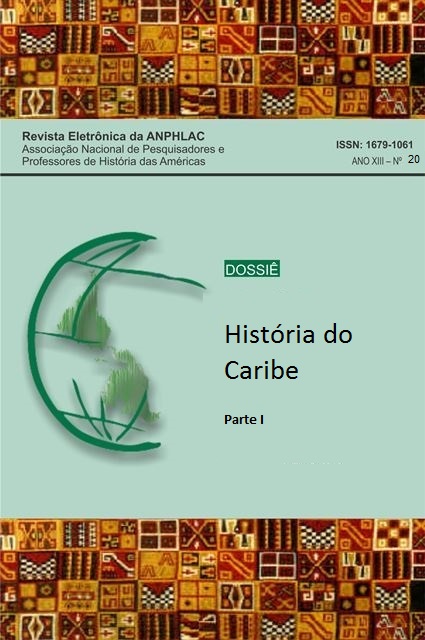Carnaval como direito: A Revolta Canboulay de 1881, em Porto de Espanha, Trinidad.
DOI:
https://doi.org/10.46752/anphlac.20.2016.2477Resumo
Este artigo busca compreender as formas de participação e organização da população negra, a racionalidade e os sentidos políticos de suas lutas pela manutenção de direitos e autonomia através da análise da Revolta Canboulay do Carnaval de 1881, ocorrida na cidade de Porto de Espanha, capital da então colônia britânica de Trinidad, no Caribe. Os foliões negros precisaram dialogar com forças sociais múltiplas – polícia, governo colonial e imprensa – que se empenharam em controlar e delimitar os sentidos dos carnavais e da participação negra na sociedade colonial. Através de fontes primárias e de bibliografia especializada, pretendemos realizar uma análise de história social da cultura, pensando a Revolta a partir das contribuições de E. P. Thompson sobre costume, direito e lei.
Downloads
Referências
BRADING, D.A. Bourbon Spain and its American empire. In: L. Bethell, org. The Cambridge History of Latin America. Cambridge: Cambridge University Press, 1984.
BRERETON, B. Race Relations in Colonial Trinidad 1870-1900, Cambridge: Cambridge University Press, 2002.
CLARKE, C. Demographic Change and Population Movement. In K. O. Laurence, org. General History of the Caribbean, Vol IV: The long Nineteenth Century: Nineteenth Century Transformations. Paris; Londres: UNESCO; Macmillian Educational, 2011.
COWLEY, J. Carnival, Canboulay and Calypso: Traditions in the Making, Cambridge: Cambridge University Press, 2003.
___________. Music & migration : aspects of black music in the British Caribbean, the United States, and Britain, before the independence of Jamaica and Trinidad & Tobago. University of Warwick, 1992.
CROWLEY, D.J. The Traditional Masques of Carnival. Caribbean Quarterly, 4(3), p.194–223, 1956.
CUDJOE, S.R. Beyond Boundaries: The Intellectual Tradition of Trinidad and Tobago in the Nineteenth Century, Wellesley: University of Massachusetts Press, 2003.
DAVIS, N.Z. Culturas Do Povo: Sociedade e Cultura no Início da França Moderna, Rio de Janeiro: Paz e Terra, 1990.
DUDLEY, S. Music from behind the Bridge : Steelband Aesthetics and Politics in Trinidad and Tobago: Steelband Aesthetics and Politics in Trinidad and Tobago, New York: Oxford University Press, 2007.
ELDER, J.D.,. Cannes Brûlées. TDR (1988-), 42(3), p.38–43, 1998.
FERGUS, C. “Dread of Insurrection”: Abolitionism, Security, and Labor in Britain’s West Indian Colonies, 1760-1823. The William and Mary Quarterly, 66(4), p.757–780, 2009.
___________. Revolutionary Emancipation: Slavery and Abolitionism in the British West Indies, Lousiana: Baton Rouge: Louisiana State University Press, 2003.
GINZBURG, C. O fio e os rastros: verdadeiro, falso, fictício, São Paulo: Companhia das Letras, 2007.
HALL, D. A Population of Free Persons. In K. O. Laurence, org. General History of the Caribbean, Vol IV: The long Nineteenth Century: Nineteenth Century Transformations. Paris; Londres: UNESCO; Macmillian Educational 2011.
LIVERPOOL, H.C. Rituals of Power and Rebellion: The Carnival Tradition in Trinidad and Tobago, 1763-1962, Chicago: Research Associates School Times, 2001.
MATTHEWS, G. Trinidad: A Model Colony for British Slave Trade Abolition. Parliamentary History, 26(4S), p.84–96, 2007.
PEARSE, A. Carnival in Nineteenth Century Trinidad. Caribbean Quarterly, 4(3), p.175–193, 1956.
PERROT, M. Os excluídos da história: operários, mulheres e prisioneiros, Rio de Janeiro: Paz e Terra, 2001.
SAMAROO, B. The imigrant Communities. In K. O. Laurence, org. General History of the Caribbean, Vol IV: The long Nineteenth Century: Nineteenth Century Transformations. Paris; Londres: UNESCO; Macmillian Educational, 2011.
THOMPSON, E.P. Costumes em comum, São Paulo: Companhia das Letras, 1998.
Trinidad Tourist Guide and Commercial and Professional Register of Port-of-Spain, Port-of-Spain: Trinidad Advertising Company, 1906.
TROTMAN, D.V. Crime in Trinidad: Conflict and Control in a Plantation Society, 1838-1900, Knoxville: University of Tennessee Press, 1986.
WADDELL, D.A.G. A poítica internacional e a independência da América Latina. In L. Bethell, org. História da América Latina, vol. 3. São Paulo: Edusp, 2004
WILLIAMS, E. History of the people of Trinidad & Tobago, New York: Praeger, 1964.
WOODING, H.O.B. The Constitutional History of Trinidad and Tobago. Caribbean Quarterly, 6(2/3), p.143–159, 1960.
Downloads
Publicado
Como Citar
Edição
Seção
Licença
a. Cessão de direitos autorais
Venho, por meio desta, ceder em caráter definitivo os direitos autorais do artigo "____________", de minha autoria, à Revista Eletrônica da ANPHLAC e afirmo estar ciente de que estou sujeito às penalidades da Lei de Direitos Autorais (Nº9609, de 19/02/98) no caso de sua infração. Autorizo a Revista Eletrônica da ANPHLAC a publicar a referida colaboração em meio digital, sem implicância de pagamento de direitosautorais ou taxas aos autores.
b. Declaração de ineditismo e autoria
Atesto que o artigo ora submetido à Revista Eletrônica da ANPHLAC, intitulado "________________________", de minha autoria, nunca foi publicado anteriormente, na íntegra ou em partes, dentro do país. Vindo a ser publicado na Revista Eletrônica da ANPHLAC, comprometo-me a não republicá-lo em qualquer outro veículo editorial.






